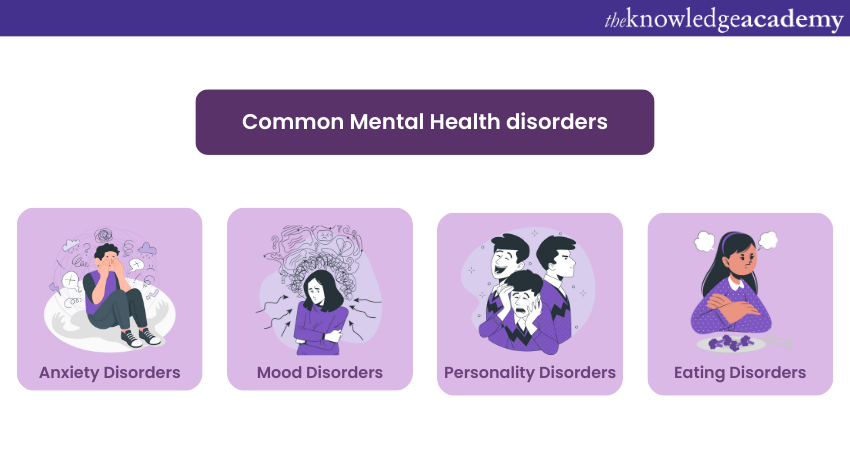We may not have the course you’re looking for. If you enquire or give us a call on 01344203999 and speak to our training experts, we may still be able to help with your training requirements.
Training Outcomes Within Your Budget!
We ensure quality, budget-alignment, and timely delivery by our expert instructors.

Mental Health is a vital aspect of a person's overall well-being, encompassing emotional, psychological, and social well-being. It affects how individuals think, feel, and act, influencing their ability to handle stress, relate to others, and make choices.
According to Statista, about 36 per cent of people worldwide believe Mental Health is the biggest health issue their country is facing, while 26 per cent believe it to be stress. It's necessary to understand and address Mental Well-being to help people fighting these Mental battles. This blog aims to explore the multifaceted domain of Mental Health, encompassing its definition, prevalent disorders, and early signs. Read more!
Table of Contents
1) What is Mental Health?
2) The prevalence of Mental Health disorders
3) Common Mental Health disorders
4) Identifying early warning signals
5) Why is Mental Health crucial to general well-being?
6) Can the state of your mental health alter over time?
7) Seeking help and support
8) Mental health care and treatment
9) Conclusion
What is Mental Health?
Mental Health definition refers to the emotional, psychological, and social aspects of an individual's well-being. It involves how people perceive and manage their emotions, handle stress, maintain relationships, and make choices. It goes beyond the absence of mental illness and emphasises the presence of positive mental states and functioning.
In the realm of emotional well-being, Mental Health encompasses understanding and expressing emotions healthily. It involves recognising and managing various emotions such as anger, fear, sadness and happiness. Psychological well-being focuses on cognitive processes, including thoughts, beliefs, and attitudes. It involves having a positive self-image, resilience, and adapting to life's challenges.
Social well-being emphasises the quality of relationships and interactions with others. It involves forming and maintaining healthy connections, fostering a sense of belonging, and participating in supportive social networks. It also includes effective communication, empathy, and cooperation with others, denoting a sign of good Mental Health.
The prevalence of Mental Health disorders
Mental disorders are highly prevalent worldwide, affecting millions across diverse populations. These disorders can occur in people of all ages, genders, and socioeconomic backgrounds. According to World Health Organization (WHO), approximately one in four people will experience a Mental Health disorder at some point in their lives. This highlights the significant impact and widespread nature of Mental Health challenges.
Mental Health disorders encompass a broad range of conditions, including anxiety, mood, personality, eating, and substance use disorders, among others. These disorders can have a profound impact on individuals, affecting their daily functioning, relationships, and overall quality of life. They can lead to significant distress, occupational or academic performance impairments, and increased healthcare utilisation.
The prevalence of mental disorders can vary across different populations and geographic regions. Factors such as genetic predisposition, environmental stressors, trauma, and societal influences can contribute to the development of these disorders. It is crucial to raise awareness about Mental Health issues, reduce stigma, and ensure access to effective Mental Health services to address the growing burden of mental disorders on individuals, families, and communities.
Learn to encourage mental wellbeing with our Mental Health and Wellbeing Training!
Common Mental Health disorders

Mental disorders exist in various types, each with unique characteristics and roots and encompass various conditions affecting individuals' thoughts, emotions, and behaviours. Understanding the different types of Mental Health disorders is crucial for recognising their signs and symptoms and promoting effective treatment and recovery.
a) Anxiety disorders: These are characterised by excessive worry and fear that can interfere with daily life. Such Mental Health disorders include generalised anxiety disorder, social anxiety disorder, panic disorder, phobias and Obsessive-Compulsive Disorder (OCD).
b) Mood disorders: These encompass Mental Health conditions such as bipolar disorder and depression (major depressive disorder). Depression involves persistent sadness and loss of interest, while bipolar disorder involves alternating periods of elevated mood (mania) and depression.
c) Personality disorders: These are characterised by enduring behaviour patterns, cognition, and inner experiences that deviate from cultural norms. Examples of these Mental Health disorders include borderline personality disorder, narcissistic personality disorder, and others.
d) Eating disorders: These are serious Mental Health conditions related to unhealthy eating patterns and distorted body image. Common types include Anorexia Nervosa (restricting food intake), Bulimia Nervosa (binge eating followed by purging), and Binge-eating Disorder (excessive food consumption without purging).
Struggling with Anxiety? Find guidance with our Handle Anxiety Masterclass Course today!
Identifying early warning signals
Identifying early warning signals is crucial for recognising potential Mental Health challenges and taking proactive steps towards well-being. By paying attention to changes in mood, behaviour, physical symptoms, social interactions, and cognitive performance, individuals can address their Mental Health needs and seek appropriate support when necessary.
Why is Mental Health crucial to general well-being?
Mental Health, alongside physical health is an equally crucial aspect of a person’s overall health. These two are mutually connected. For example, if a person is suffering from anxiety, it also leads them to physical health problems such as heart disease or diabetes, which are usually long- lasting. In the same way, a person having an underlying physical condition has an increased risk for Mental Health illness.
Can the state of your Mental Health alter over time?
It is a universal truth that a person’s Mental Health changes over time. This is due to various factors which affect one’s personality. A person can develop a Mental illness if they are in a situation of hardship or a crisis in life. If a person has to deal with more pressure than they can handle, it can affect their mental well-being.
Changes in mood and behaviour
Noticeable changes in mood and behaviour can serve as early warning signals for potential Mental Health issues. Sudden emotional shifts, increased irritability, and unexplained anger may indicate underlying concerns. Recognising and addressing these changes is crucial for maintaining mental well-being.
Persistent physical symptoms
Persistent physical symptoms, such as headaches, stomach aches, fatigue, and sleep disturbances, can indicate underlying Mental Health issues. Acknowledging the connection between physical and mental well-being is important. Seeking medical and Mental Health support is essential for holistic care.
Social withdrawal and isolation
Social withdrawal and isolation are significant early warning signals of Mental Health issues. Avoiding social interactions, losing interest in activities, and reluctance to engage may indicate anxiety, depression, or other conditions. Recognising the importance of social connection and seeking support is vital for mental well-being.
Decline in performance or concentration
A decline in performance and concentration can be early signs of Mental Health concerns. Difficulties with focus, decision-making, and completing tasks may indicate anxiety, depression, or ADHD. Seeking support, implementing strategies, and practising self-care is key to managing these challenges effectively.
Substance abuse
Substance abuse can be an early warning signal for underlying Mental Health issues. Individuals may turn to substances to cope with emotional pain or distress. Recognising the link between substance abuse and Mental Health is crucial for seeking comprehensive support and treatment for both issues.
Learn to build foundation for emotional health with our Mindfulness Training!
Seeking help and support
When it comes to mental well-being, seeking help and support is crucial for overall well-being. By accessing professional Mental Health services, building supportive networks, and practising self-care, individuals can nurture their mental and emotional health and find the necessary resources for support and healing.
Professional Mental Health services
Seeking professional Mental Health services is crucial for addressing concerns regarding mental well-being. Mental and emotional care professionals, such as therapists, counsellors, and psychiatrists, can provide assessment, diagnosis, and appropriate treatment options. These professionals provide a safe and supportive environment to explore and manage Mental Health issues, promoting overall well-being and recovery.
Supportive networks and communities
Having supportive networks and communities is invaluable for Mental Health. Surrounding oneself with understanding and empathetic individuals can provide a sense of belonging, validation, and emotional support. Engaging with support groups and online communities or seeking guidance from trusted friends and family members can help navigate challenges and foster resilience.
Self-care practices
Engaging in self-care practices is essential for maintaining and improving Mental Health. Prioritising activities that promote relaxation, stress reduction, and self-reflection can have significant benefits. This includes practices such as exercise, mindfulness, healthy sleep patterns, hobbies, and setting boundaries. Self-care contributes to overall well-being and enhances resilience against Mental Health challenges.
Mental health care and treatment
In order to raise awareness about Mental Health it is important to consider the Mental Well- being of fellow humans and addressing it. The stigma surrounding Mental Health should be eliminated and a wider perspective should take form while dealing with it.
This can be brought into effect by forming a community based Mental Health care centre. The reason why it is important to form a community-based health care is discussed below:
a) It is easily accessible by a common man.
b) It is more affordable than institutional care.
c) It helps in preventing human rights violations.
d) It also yields better results for people with Mental illness.
Mental Health help in the community should come from different services or sectors that work together to achieve a common objective. For example:
a) Making Mental Health services a part of regular healthcare, often in hospitals, and through a non-specialist healthcare worker in local clinics.
b) Community Mental Health services can consist of things like professional support, programs to help with recovery, support from peers who have had similar experiences, etc.
c) Services that give Mental Health care in places like child protection, schools, and prisons should work together
Countries must come up with more reasonable ways to deal with Mental Health problems such as depression and anxiety. Through this way a better society which cares about Mental Health can be nurtured.
Conclusion
Prioritising Mental Health is essential for overall well-being. You can take proactive steps towards maintaining optimal mental and emotional well-being by recognising early warning signals, seeking help and support, and engaging in self-care practices. Remember, your well-being matters; talk to your close ones if you need help and remember, there are resources available to support you on your journey.
Don’t struggle alone, try our Psychological Skills Training for Human Wellness Training!







 Top Rated Course
Top Rated Course




 If you wish to make any changes to your course, please
If you wish to make any changes to your course, please


